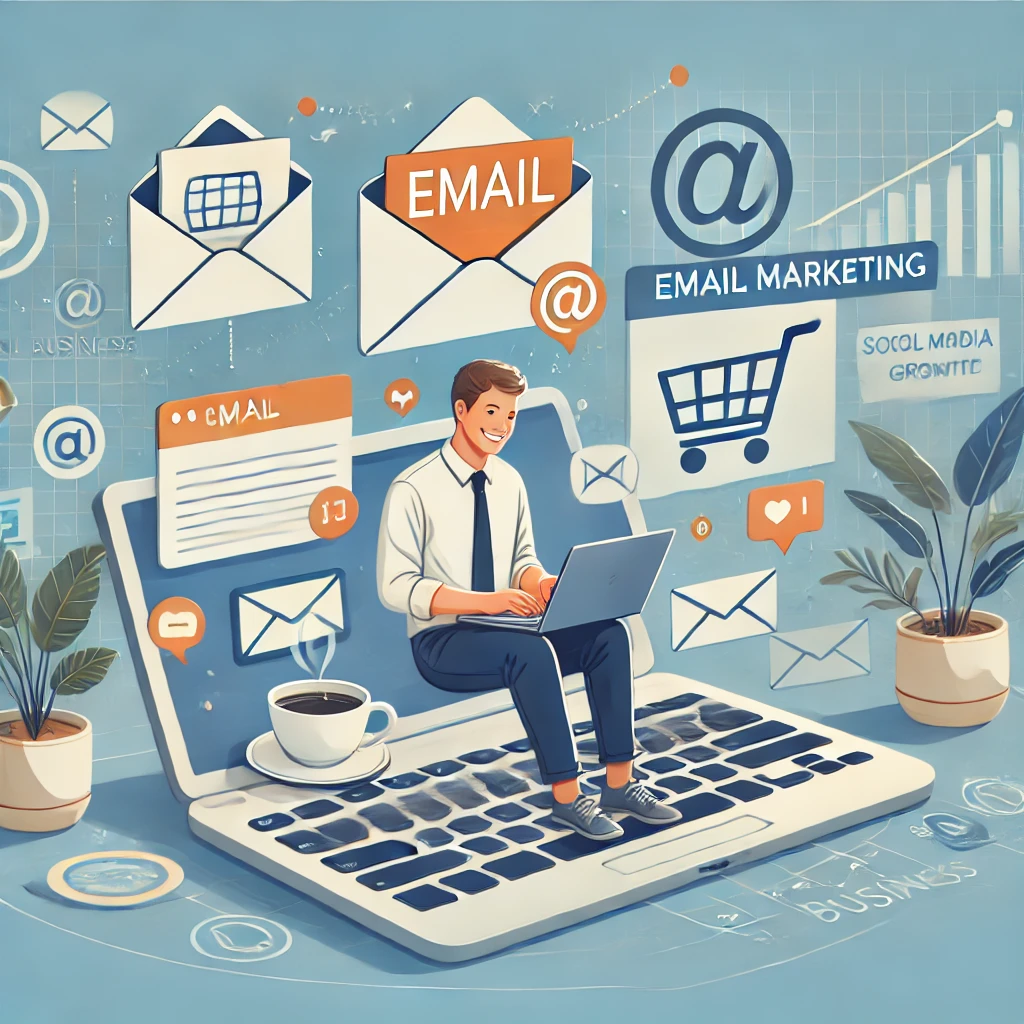
Email Marketing for Small Businesses: The Ultimate Guide
Your complete roadmap to building an effective email marketing strategy that boosts sales, builds relationships, and grows your business online.
1. Why Email Marketing Matters for Small Businesses
Email marketing is one of the most powerful tools for small businesses. Why? Because it allows you to connect with customers, build loyalty, and drive sales—all at a fraction of the cost of traditional advertising. If you're not using email marketing, you're leaving money on the table.
2. Getting Started: Building Your Email List
2.1. The Importance of an Engaged Audience
Having a huge email list is great, but quality trumps quantity. Focus on attracting engaged subscribers who actually want to hear from you.
2.2. How to Build an Email List from Scratch
- Offer a freebie (lead magnet) like an eBook, discount, or exclusive content.
- Use pop-up forms on your website.
- Leverage social media strategies for startups by promoting sign-up incentives.
- Host webinars and collect attendee emails.
3. Crafting the Perfect Email: Content and Design
3.1. Writing Emails That People Actually Read
No one likes boring, robotic emails. Write like you talk! Keep it conversational, use short paragraphs, and add a personal touch.
3.2. Designing Emails That Convert
Use clean, mobile-friendly templates. Add eye-catching visuals and a clear call-to-action (CTA) that guides your reader to take the next step.
4. Email Marketing Automation: Work Smarter, Not Harder
Automation saves time and boosts engagement. Set up welcome emails, cart abandonment sequences, and personalized follow-ups to keep your audience engaged without doing all the heavy lifting yourself.
5. Best Tools for Managing Your Email Marketing Campaigns
Looking for the best tools for managing your business operations? Consider these email marketing platforms:
- Mailchimp: Great for beginners, with easy-to-use automation.
- ConvertKit: Perfect for content creators.
- Klaviyo: Ideal for e-commerce businesses.
- ActiveCampaign: Powerful automation features.
6. Time Management for Entrepreneurs: Running Email Campaigns Efficiently
Balancing email marketing with daily business operations can be overwhelming. Use batch processing, schedule emails in advance, and automate repetitive tasks to free up your time.
7. Measuring Success: Email Marketing Metrics You Should Track
To improve your campaigns, track these key metrics:
- Open Rate
- Click-Through Rate (CTR)
- Conversion Rate
- Unsubscribe Rate
- ROI (Return on Investment)
8. Organic Growth Strategies for Businesses: Leveraging Email Marketing
Email marketing can be a powerful organic growth tool. By consistently delivering value, you build trust, encourage word-of-mouth referrals, and increase brand loyalty.
9. Personal Branding for Entrepreneurs: Using Email to Build Authority
Want to establish yourself as an expert? Use email newsletters to share insights, industry trends, and personal stories that connect with your audience.
10. Financial Strategies for Startups: How Email Marketing Saves Money
Email marketing is one of the most cost-effective ways to promote your business. With minimal investment, you can reach a highly targeted audience and maximize your marketing budget.
11. E-commerce for Local Businesses: Driving Sales Through Email
Own a local shop? Use email marketing to send personalized offers, product updates, and event invitations to keep your customers engaged.
12. Sustainability in Small Businesses: Using Email to Reduce Waste
Go green by reducing paper-based marketing. Email marketing is an eco-friendly alternative that still allows you to connect with customers effectively.
13. Pricing Strategies for Digital Products: How to Use Email Marketing
Email campaigns can help you test different pricing strategies, offer exclusive discounts, and drive conversions for your digital products.
14. Digital Transformation for Traditional Businesses: Email Marketing as a Key Player
Shifting from traditional to digital? Email marketing is a great first step in reaching your audience online and adapting to the digital world.
15. Conclusion
Email marketing is an essential tool for small businesses. By building a strong email list, crafting engaging content, leveraging automation, and tracking key metrics, you can turn email into a powerful revenue-driving strategy. Whether you're just getting started or looking to improve your current campaigns, there's no better time to focus on email marketing.
FAQs
1. How often should I send emails to my subscribers?
It depends on your business, but a good rule of thumb is once a week. Stay consistent without overwhelming your audience.
2. What's the best way to avoid the spam folder?
Use a professional email address, personalize your emails, and avoid spam-trigger words like "free money" or "guaranteed success."
3. Can I use email marketing if I have a small budget?
Absolutely! Many email marketing tools offer free plans, making it an affordable option for startups and small businesses.
4. How do I get more people to open my emails?
Write compelling subject lines, personalize your emails, and send them at optimal times for your audience.
5. Is email marketing still effective in 2025?
Yes! Email marketing continues to deliver one of the highest ROIs compared to other digital marketing channels.